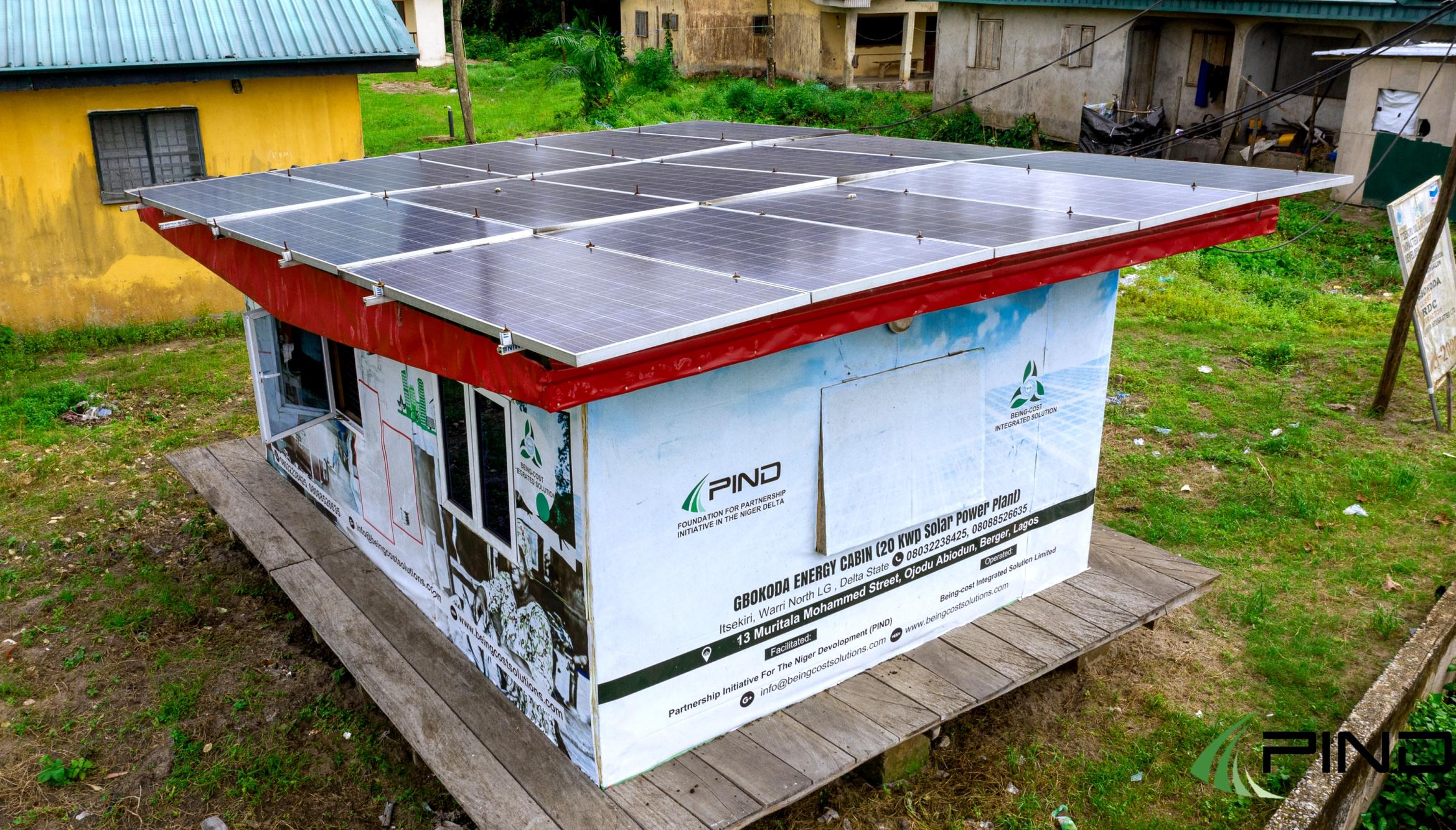
1 minute read
LIGHTING UP THE NIGER DELTA
Access to Energy enables people to work out of poverty and improve their well-being, such as health and education, especially for women and children.
PIND's experience has shown that contrary to some popular beliefs, the remote coastal communities in the Niger Delta region have a productive use for electricity and can afford access. Therefore, we created an A2E model that focused on reducing the risks for investors and power developers.
We facilitate connections between power developers and communities. The developers install and maintain solar energy solutions specific to the communities' needs (energy cabins, mini-grids, and solar refrigeration hubs). At the same me, the residents subscribe to gain access at a reduced cost compared to their spending on fueling and maintaining generating sets. These generating sets have usually served as alternate sources of electricity. However, apart from the cost of running them for up to 12 hours a day, the generating sets also cause air and noise pollution.

Our model solves three problems: lack of access, youth employment, and improved livelihoods. Apart from facilitating the installation of these grids, we also ensure that there are opportunities for young people within the community to be employed either as installers or in maintenance. Thus, our A2E interventions address UN SDGs 7, 8, and 11: access to affordable energy, decent work, and climate action. Our vision is to light up the Niger Delta one community at a me.
I Saw The Actual Value And Impact Of The Mini Grid
Before meeting PIND, I had been running a renewable energy company for more than seven years, where we install solar panels and sell other renewable energy products. I learned about PIND in 2022 through the Renewable Energy Service Providers Association of Nigeria (RESPAN). Then I attended one of PIND's Access to Energy model sharing workshops in Port Harcourt. Although I had heard about mini-grids before the workshop, I had been skeptical about exploring them as a business opportunity as I was worried about the security risks. PIND promised to facilitate and bridge the gap of community engagement with the people. I also networked and had one-on-one conversations with other renewable energy investors who had worked with PIND on similar projects.
In June, PIND took me on an assessment tour of Adagbarasa, Warri North LGA of Delta state, to learn the community's energy needs and viability as a mini-grid installation location. It was the first me I had gone to a community by water. With PIND facilitating the engagement, I had no issues interfacing with the people. I was particularly encouraged by their excitement towards the project. Like most coastal communities, they were off the national grid, so they saw the opportunity to access a low-cost and sustainable source of electricity. It was then I saw the actual value and impact of the mini grid.
After the assessment, I reached out to another organization that had promised to support me with some of the materials for the grid. However, they declined to help because they deemed the community too small, and the project less economically viable than initially hoped. I was discouraged because it was new terrain for me business-wise, and these people who had been in the sector didn't think it was worth it. However, after some deliberation and considering the impact on the lives of the people, I decided to continue on my own and use the experience as a learning process.
I reached out to PIND once more, expressed my concerns, and told them the areas I would need support. I also spoke about the issue of access to the community seeing that you could only reach it by water, and we would need to move heavy equipment there to install the cabin. We also spoke about funding and management of the grid after installation and my lack of experience in the sector. PIND stepped in, and their support exceeded my expectations. Based on my proposal, PIND awarded me a grant that covered the materials needed to install the grid.
Since meeting PIND, my organization's confidence level, skills, and experience have improved. Going into the mini-grid sector has improved our capacity and given us access to an industry we would have never believed we could enter. Another value to the organization is that we have improved our business structure to accommodate this new expansion in the energy sector. Already, we have seen even more opportunities to explore.
Francis Owieadolor Oghosa Limited Delta State
Now, Every Home Has A Daily Supply of Electricity
Before the mini-grid was installed in our community, we had never had access to electricity. If we needed to charge our phones, we would have to go to neighboring communities or seek help from neighbors who could afford generators.
Now, every home has a daily supply of electricity. We have power throughout the day, and then the mini grid goes off at about 3 am to enable the batteries to fully recharge before it is turned on again at 6 am.
Those charging their phones in other communities can now do so in their homes. People no longer need to rely solely on their generators for electricity supply in their homes and businesses.
I thank PIND for this opportunity and Mr. Francis Owieadolor, CEO, of Oghosa Limited, for accepting to come to our community. Most of the riverine areas around us need access to electricity, which has always been challenging. This opportunity has opened up Adagbarasa Community, and neighboring communities would like to benefit from the project.










